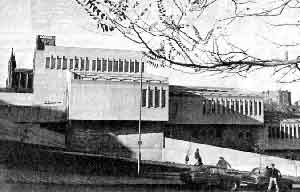
 |
Online
Archive
|
| Issue 11 - March 1973 |
| C'Est La Vie (Frentch - The Knaas) |
 Over the past
ten or so years the University has carried out an enormous plan of
development and redevelopment at the expense of acres of rural land
to the south of the city and of many old streets and buildings in the
city centre. The whole question of the University's expansion, its
devious causes and its evil effects was discussed in an excellent article
in Ferret, a University alternative newspaper, which existed about
two years ago. This pointed out that the University was virtually a
monopoly buyer of certain land in Durham because of two acts of Parliament.
One apparently reserves large quantities of land either for agricultural
purposes or for acquisition by the University, which land is said to
be useless to farmers because they have long since moved out of the
urban area. The other act, the University and Colleges (Estates) Act
of 1964 which applies to Oxford, Cambridge and Durham only, allow -
among other things - the exchange of plots of land with other land
owners. Mr Graham denied categorically that either of these acts had
ever been used in Durham and yet claimed later in the interview that
the University had exchanged some land behind the prison for land in
New Elvet. He also said that he could not call to mind the amount of
land owned by the University in Durham but later, when defending the
University's economic role in the city, he claimed that it paid a third
of the rates. So the amount of land it owns must be considerable. Over the past
ten or so years the University has carried out an enormous plan of
development and redevelopment at the expense of acres of rural land
to the south of the city and of many old streets and buildings in the
city centre. The whole question of the University's expansion, its
devious causes and its evil effects was discussed in an excellent article
in Ferret, a University alternative newspaper, which existed about
two years ago. This pointed out that the University was virtually a
monopoly buyer of certain land in Durham because of two acts of Parliament.
One apparently reserves large quantities of land either for agricultural
purposes or for acquisition by the University, which land is said to
be useless to farmers because they have long since moved out of the
urban area. The other act, the University and Colleges (Estates) Act
of 1964 which applies to Oxford, Cambridge and Durham only, allow -
among other things - the exchange of plots of land with other land
owners. Mr Graham denied categorically that either of these acts had
ever been used in Durham and yet claimed later in the interview that
the University had exchanged some land behind the prison for land in
New Elvet. He also said that he could not call to mind the amount of
land owned by the University in Durham but later, when defending the
University's economic role in the city, he claimed that it paid a third
of the rates. So the amount of land it owns must be considerable.
Mr Graham insists that the University is the city's benefactor. Commenting on the disastrous appearance of New Elvet he reassured us that it would look fine once Elvet Riverside 2 had been built and when "the city does its bit" and completes its own development on the far side of Elvet Bridge. Then says Mr Graham the river bank will have continuity ... there will be a pleasant riverside walk which the local people can enjoy. The mind boggles. The University, of course, is not the only offender - Milburngate House and the loathsome Woolworths and Marks and Spencer buildings bear witness to this. It is merely one of the three most powerful institutions in Durham, the others being the City Council and the Church (which is not involved in this issue since it presumably wants to preserve the Cathedral and its environs). But it ought, as an institution of learning, to be enlightened and reasonably aware of its environment and the people who live there. Instead it looks exclusively to its own interests and is engaged in fact if not in spirit in a carve-up of the city with the far from enlightened city council (see Ferret 2). Ian Graham wants to know who complains. He hears no complaints because he thinks the city is the Council and a handful of tradesmen who benefit from the purchasing power of students and people who attend conferences. The students don't complain because they are too immersed in their own interests - more so than students from many other Universities. The people who lose are people the University scarcely know exist. They don't live in the city, because no-one can, because the houses are being knocked down and rents are rising phenomenally. They are the people who live on the borders of the city in housing estates provided for them by the Council, people who work all week and are allowed into the city on Saturdays to fight their way along crowded pavements to the shops and those pubs that are left; who wait in endless dreary bus queues; who sometimes mourn the passing of an old haunt but feel powerless to do anything about it; who are cheated and taken for granted; whose needs are largely unknown and whose opinions are not really taken into consideration - ever. |